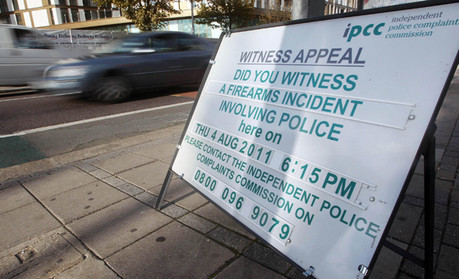
The IPCC appeals for witnesses to Mark Duggan's death in Tottenham last week
Credit: Lewis Whyld/PAThe Independent Police Complaints Commission said today (12 August), that it "may have inadvertently given misleading information to journalists" regarding the death of Mark Duggan, who was shot by Metropolitan police officers last week.
Duggan's death sparked rioting in Tottenham, where the incident occurred on 4 August, which led to widespread violence and looting around the UK.
Today's IPCC statement acknowledges that information the body gave to the media in the hours after Duggan's death may have given journalists the impression that Duggan fired at Met police officers before he was shot.
"[H]aving reviewed the information the IPCC received and gave out during the very early hours of the unfolding incident, before any documentation had been received, it seems possible that we may have verbally led journalists to believe that shots were exchanged, as this was consistent with early information we received that an officer had been shot and taken to hospital.
"Any reference to an exchange of shots was not correct and did not feature in any of our formal statements, although an officer was taken to hospital after the incident."
The IPCC adds that analysis of media coverage and queries raised on Twitter had alerted it to the possibility that it may have misled the media.
Early reports of Duggan's death suggested that police officers were fired upon, citing the discovery of a bullet lodged in the radio of one of the officers.
The bullet was later shown to have been fired by a police-issue gun however, and no further evidence has emerged to suggest that Duggan fired at officers.
A report published by the Telegraph in the hours after the incident said: "A policeman's life was saved by his radio last night after gunman Mark Duggan opened fire on him and the bullet hit the device."
The report cites an IPCC spokesman as saying: ''We understand the officer was shot first before the male was shot.''
The Daily Mail reported that Duggan had "shot the officer from Scotland Yard’s elite firearms squad CO19 in the side of his chest with a handgun", and the Sun similarly reported that Duggan was "downed by a marksman after firing first and hitting the officer".
The IPCC issued a statement on 7 August – during the height of rioting in London – confirming reports that the bullet lodged in the officer's radio was in fact police-issue. It later issued a further statement to explain the controversial timing of the announcement:
"We are aware that the information we issued this afternoon was sensitive and it was very difficult to balance the need to put factual information into the public domain to try to correct inaccurate speculation, with the desire not to inflame the situation further.
"With this in mind, we spent the day consulting community leaders, as well as taking on board the wishes of Mr Duggan’s family and ensuring the Met, and other relevant parties, knew what we were going to issue.
"We echo the calls of Mr Duggan’s family not to use his death as an excuse for violence and disorder. We also ask people not to jump to conclusion based on the information today. There is still much to do to establish the sequence of events that led to Mr Duggan’s death.
Today's statement was issued by the IPCC in response to a request by Guardian reporter Paul Lewis, who has been covering the riots in both London and Birmingham.
Free daily newsletter
If you like our news and feature articles, you can sign up to receive our free daily (Mon-Fri) email newsletter (mobile friendly).











